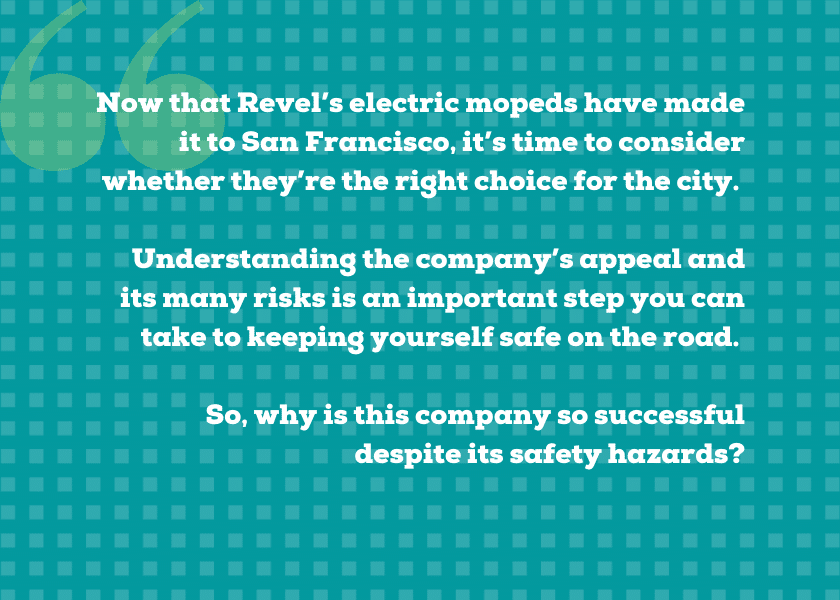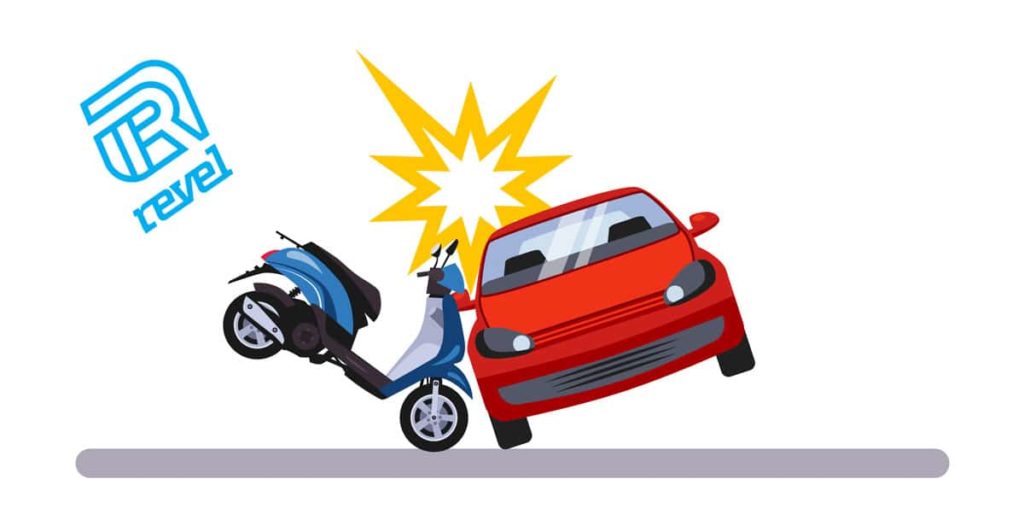There’s a new danger coming to roads near you. Revel, the rentable electric moped company that first got its start in New York City, has recently expanded into San Francisco and the Berkeley area. The company aims to help minimize the traffic congestion that’s long plagued the region and fill a gap in the “micromobility” market. The question is this: is it worth inviting Revel to the area if it puts everyone at risk?
The company has been linked to more than 340 collisions in just six months in their home market of New York. They even shut down for most of August to address safety concerns after their mopeds were involved in four death in just ten days. Recent reports have highlighted exactly how appealing and how dangerous these mopeds can be. Although they’re convenient, that very convenience may be a strike against them.
Now that Revel’s electric mopeds have made it to San Francisco, it’s time to consider whether they’re the right choice for the city. Understanding the company’s appeal and its many risks is an important step you can take to keeping yourself safe on the road. So, why is this company so successful despite its safety hazards?

The Rise of Revel
In many ways, the appearance of a company like Revel was inevitable. After Uber pioneered the concept of “rideshares,” the idea of sharable forms of transit became too tempting to resist. Bikeshare programs came next, allowing people to pick up and drop off traditional pedal-powered bikes at docking stations or at random. From there, rideshare and rentable transportation exploded. Electric bikes and scooters offered the ease of rideshares with the convenience and lower cost of the bikeshare programs.
What Revel has that e-bikes don’t is speed and ease of use. Mopeds don’t require the user to pedal at all and can easily reach speeds of 30 mph. They also allow riders to sit instead of stand, making them more appealing than scooters. They fill the final niche between walking and riding in a car.
In New York, these vehicles also offered some legal benefits. Until 2020, e-bikes and e-scooters were illegal in the city. However, electic mopeds were considered class B motorcycles; they already had legal precedent and guidelines surrounding their use. Anyone with a standard driver’s license is legally allowed to use a moped in the city as long as they follow the rules of the road.
People took advantage of that availability and flexibility in droves. When the pandemic began, Revel offered medical employees free rides as a marketing technique, and by the end of the year, their rider numbers had skyrocketed to more than 400,000. However, their rapid expansion also led to a steep rise in accidents.
A Checkered Safety Record
When Revel first began, they had minimal regulations in place. Essentially, they offered their mopeds to anyone who had a valid driver’s license and the funds to rent the ride. This quickly led to problems.
Revel riders were often spotted taking risks like riding the wrong way down one-way streets, riding on sidewalks, operating mopeds without helmets, and driving while intoxicated. In August, when Revel voluntarily shut down, they took measures to combat these risks. However, their strategies, which include requiring users to take selfies while wearing helmets and banning users identified as riding against traffic, only cut the problem in half. The email the company sent to customers included the quote, “We can’t believe we have to say this, but no running red lights.” However, accidents are continuing to occur.
For example, in New York state, more than 40 lawsuits have been filed against Revel due to safety concerns. Complaints vary, but they are all filed on behalf of people injured or killed in a the company’s moped accident. Pedestrians and riders alike have died because of a lack of training and safety precautions from the company.
The Increased Risks of Revel’s Rentals
Out of the many forms that ridesharing now takes, Revel’s mopeds are some of the riskiest. The problem is that the very aspects that make the company’s vehicles so appealing are the traits that make them dangerous.
Access: First, anyone with a valid standard driver’s license is legally allowed to drive a moped. However, mopeds do not drive like cars in the least; they require balance and an understanding of how two-wheeled vehicles operate.
Availability: Revel customers can get on any moped owned by the company, anywhere in the city. The ubiquity of these vehicles, combined with the lack of ownership, makes poor decisions like intoxicated driving or riding on sidewalks more likely.
Size: Even the biggest e-bike is not as large as a moped. The mopeds are heavy enough to cause riders and pedestrians alike severe injuries in a crash.
Speed: Finally, mopeds can easily reach the speed of traffic in the city, making it legally necessary for riders to stay on the road. In an accident between a moped and a car, the unprotected rider will always lose.
Quite simply, Revel has made fast, heavy vehicles available for anyone to drive while doing little to protect riders or other people on the road. That makes these scooters one of the most dangerous methods of travel available.
Safety vs. Mobility: Where to Draw the Line
Of course, no matter how dangerous Revel may be, there will always be some people to whom the benefits outweigh the risks. It’s no secret that commuting in the Bay Area is complicated and slow. For many people, riding a rideshare scooter will be appealing enough to overcome potential concerns. Even if Revel leaves the area or shuts down, it’s inevitable that another company will take its place.
For all these reasons, California must consider exactly what precautions these companies should put in place. There’s no reason for a commute to put so many people’s lives at risk. Until a more thorough training process and a better method of protecting pedestrians are put in place, Revel will continue to put all road users at risk.





